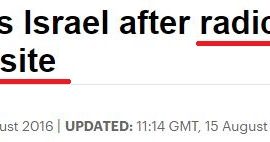1) Since mid-December BBC audiences have repeatedly been told (in accordance with PLO messaging) that the proposed relocation of the US embassy in Israel to Jerusalem would mean an end to the peace process – although none of the corporation’s journalists has bothered to question why that should be the case. At the Tower, Eylon Aslan-Levy notes that “Jerusalem Already Has Plenty of Embassies—Just Not to Israel“.
“Much has been made in recent months of President Donald Trump’s pledge to move the U.S. embassy in Israel from Tel Aviv to Jerusalem and its possible repercussions. The public conversation has generally concentrated on the potential diplomatic and political fallout, especially the possibility of a new outbreak of Palestinian violence. Lost in all the controversy, however, is the fact that the U.S. is one of nine countries that already has a de facto embassy in Jerusalem. But these are all embassies to the Palestinians, not Israel.”
2) Also at The Tower, Jamie Palmer has a long and very interesting essay titled “Getting International Law Right on the Next Gaza War” that will likely touch a chord with anyone who remembers how, less than 24 hours after the conflict of summer 2014 began, the BBC rushed to promote to its audiences worldwide the notion that Israel was committing ‘war crimes’ in the Gaza Strip.
“Last April, Democratic presidential candidate Sen. Bernie Sanders (I-Vt.) told the New York Daily News, “My recollection is over 10,000 innocent people were killed in Gaza. Does that sound right?”
It did not sound right. By inflating the total number of those killed in 2014’s Operation Protective Edge by a factor of nearly five, and the estimated number of civilian dead by almost double that again, Sanders demonstrated something more than mere ignorance of international affairs: That such a horrifying death toll should strike him as not just plausible but accurate enough to repeat betrayed his prejudices regarding Israel’s supposed capacity for callous brutality.
“My understanding is that a whole lot of apartment houses were leveled,” he continued. “Hospitals, I think, were bombed. So yeah, I do believe and I don’t think I’m alone in believing that Israel’s force was more indiscriminate than it should have been.”
In a subsequent interview with CNN’s Jake Tapper, Sanders conceded that he had misstated the casualty figures, but stuck to his accusation of indiscriminate force, as if the rather large difference between 10,000 and roughly 1,000 were neither here nor there. “Was Israel’s response disproportionate? I think it was,” he continued to insist.
In fact, the one point on which Sanders was correct is his claim that he is not alone in his general assessment of Israeli military conduct. During the conflict, various journalists and human rights groups accused Israel of violations of international law that amounted to war crimes.”
3) At the Jewish News, Maajid Nawaz takes a look at the BDS campaign spin-off ‘Israel Apartheid Week’.
“The Boycott Divestment and Sanctions (BDS) movement is mostly spearheaded in the West by people who have little to nothing attaching them to the Middle-East conflict.
Nothing, that is, beyond the fact that belonging to the hard-left and not supporting BDS has become the equivalent of claiming a love for fashion, while hating haute couture. Though unlike haute couture, BDS is an inelegant and simplistic solution to a protracted and incredibly complicated problem. But who cares for detail when you have a fabulous placard to wave?
The lazy analogy that BDS rests on is with South African apartheid. But unlike apartheid-era South Africa, Arabs make up 20 percent of Israel’s full citizenry. Most of these Arab-Israeli citizens are Muslim. There are mosques on Israeli beaches. Alongside Hebrew, Arabic is an official language of Israel. An Arab-Israeli judge has even impeached and convicted former Israeli prime minster, Ehud Olmert.
And though many problems with integration persist – as they do with minority communities across the West – when surveyed 77 percent of these Arabs expressed an overwhelming preference to remain Israeli, rather than become citizens of a future Palestinian state.
The reason is obvious, Israeli-Muslims have more freedom of religion than other minorities – and even other Muslims have in all other Middle-Eastern countries.
The problem lies in the status of the West Bank and Gaza, not with any imaginary apartheid system inside Israel proper. So lazy is the apartheid analogy that I could effectively end my article at this paragraph. But so entrenched has our political laziness become, I feel compelled to carry on.”




